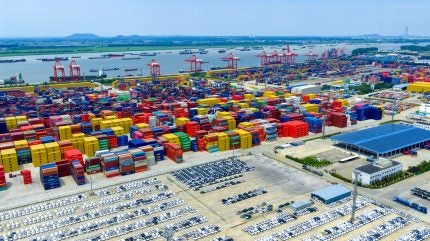
The tariffs being introduced by the Trump administration in the US and the subsequent counter tariffs elsewhere are leading companies to localise and automate their supply chains in mitigation, a new report outlines.
GlobalData’s Impact of Tariffs on Supply Chains report states that the global trade war and increased geopolitical tensions caused by the sudden and rapid rollout of new tariffs around the world will end the era of hyper-globalisation. It suggests that, while globalisation will continue, it will look very different.

Discover B2B Marketing That Performs
Combine business intelligence and editorial excellence to reach engaged professionals across 36 leading media platforms.
“In the short term, tariffs will impact demand and inventory planning,” the report explains. “To avoid initial tariff hikes, companies increased inventories in the US. Carrying larger inventories will become best practice if tariffs continuously increase, resulting in recurring price hikes for goods and services. Maintaining large inventories can be costly if demand declines rapidly. GlobalData expects demand to stay stable until the end of 2025 but may begin to dip in 2026 if the US economy enters a recession.”
In the longer term, for companies to minimise costs related to tariffs, GlobalData indicates that they will need to reduce their reliance on global trade routes.
“Over the next five years, all major economies will try to reindustrialise and stimulate domestic demand,” the report says. “Trade restrictions and stimulus packages will incentivise, or even force, companies to reconfigure their supply chains. There will be a shift towards localising supply chains to avoid the financial and operational penalties associated with offshoring production.”
It notes, however, that reconfiguring supply chains is a lengthy, complex and expensive process. With this in mind, the report also forecasts increased investment in technology.

US Tariffs are shifting - will you react or anticipate?
Don’t let policy changes catch you off guard. Stay proactive with real-time data and expert analysis.
By GlobalData“Reconfiguring supply chains will accelerate automation,” it says. “While automation requires significant upfront investment, it can help reduce labour costs, increase manufacturing efficiency and alleviate the financial burden caused by rising tariff rates and reshoring production. Beyond industrial automation, AI-powered tools can also analyse historic market data and help predict when and how future disruptions will impact supply chains.”
Among other long-term recommendations outlined in the report are the assessment of alternative manufacturing locations, exploration of new markets and investment in robust supply chain management tools.
Navigate the shifting tariff landscape with real-time data and market-leading analysis. Request a free demo of GlobalData’s Strategic Intelligence here.





